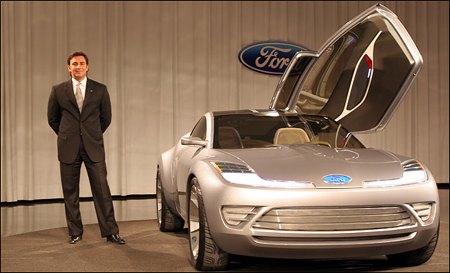Ford's Fields: Don't Blame ME You Bastards
So Ford's President of the America's, Mark Fields, did his stint at the Traverse City auto industry management mahalo. Ford was kind enough to publish the formerly private jet-setting Fields' speech, which we present below. His opening theme is clear (expressed above): "I also have been watching some of the recent commentary – including from speakers this week – about who's to blame for the auto industry not anticipating the dramatic increase in fuel prices and the accelerated segmentation shifts this year. But I really wonder if that is where we should be spending our energy as industry leaders." No, of course not. (Ignoring the fact that Fields was in power way back then.) Even stranger: "While none of us would have planned for the sharp downturn in the industry or the dramatically accelerated segment shifts, we are seizing the opportunity in a dramatic way." Would have? Yes, the guy's got a 'tude. "Some of our rivals snickered when we first starting talking about EcoBoost nearly two years ago – but it's interesting to see others trying to catch up with us…" To be fair, Fields is making all the right noises, plan-wise. But you have to wonder why such a shoulder-chipped old school Detroit apologist (and aspiring CEO) wasn't swept away by Alan Mulally's new broom.
More by Robert Farago


































Comments
Join the conversation
davey49: The way that trucks and SUVs were made artificially attractive was by what wasn't done to them, but was done to cars. Fuel economy standards imposed in the 1970s and later were substantially laxer for light trucks and non-existent for heavier models. Likewise for many "safety" standards, e.g. the collision standards that mandated big ugly bumpers on cars from about '74 or so, until makers worked out how to do the body-colored plastic things they use now. The way fuel economy and emissions standards were implemented had the net effect of simply encouraging manufacturers to make (and customers to buy) larger vehicles than they did before. The only thing that increased overall fuel economy in the 70s and 80s was the fact that gas had become more expensive - not the useless fuel economy regulations. Emissions standards were also slanted, in that what mattered for them wasn't the net emissions per mile or person-mile, but rather what percentage of the car's overall tailpipe emissions was of certain compounds. For the same tailpipe gas composition, a little Honda produces much less pollution than a truck, but that is completely ignored by the emissions regulations. These biases in regulation and law, probably due to lobbying by commercial interests in the case of fuel economy standards and the Big Three in general on emissions, artificially distorted the US auto market in the last 35 years or so. How many people bought a truck for personal transportation in 1970?
Psarj- Toyota has always had to design cars for markets that have had high fuel prices. Morven- I kind of figured all that, I was just wondering if it was anything specific. You're obviously comparing greenhouse gas emissions (which is tied to fuel use) to pollution (which is not) The EPA and CARB have only regulated pollution which is the same for trucks and cars equally. I'm not sure that any of this make trucks more attractive. I've always liked trucks because they rode high and held lots of stuff. Plus they tow campers, boats, race cars, snowmobiles etc. As far as 1970 goes, I was 3 years old but every family I knew had a truck throughout the 70s. Maybe not as their only car but I remember a lot of trucks. I personally have never known anyone who had a truck or full size SUV as an only vehicle. My brother has a beat up old Ford Explorer but I don't count that. Explorers are tiny.